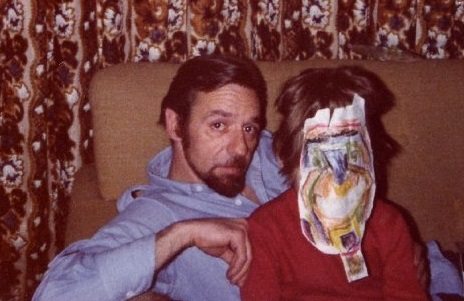The Family That Smokes Together
by Christopher Bloom
Before Dad was a physician, he was a smoker. And, because we lived in his house, we were smokers too.
Throughout my life, people have thought it odd that a doctor could also smoke, but it’s not really so strange because Dad started his habit at 14. Smoking was one of the things people did back then, all the time—at home, at work, at parties. Millions of soldiers received free cigarettes during World War II, and when they returned home from the war, they were hailed as heroes, role models for kids everywhere. And our heroes smoked.
My father was already a veteran smoker before he ever set foot in med school, and any doctor will tell you that med school is incredibly stressful—it’s not the best environment for quitting anything, except maybe sleep. Plus, he enjoyed it. These were the days before the Surgeon General’s package warnings, the terrifying ads, and the lawsuits. By 1966, when the warnings started appearing on cigarette packaging, he’d already spent half of his time on Earth as a smoker.
As kids, my sister and I waged a failing war against the cigarettes: We begged and pleaded, we pinched our noses and complained about the horrible smell. We hid the packs and the ashtrays. I’ll bet many of you did the same things to your parents. One time I even “loaded” a cigarette, which resulted in a small explosion that angered Dad, not because he was surprised by it but because the cinders nearly burned his shirt. But every time we tried, he proved that his love of smoking was somehow stronger than we were.

My father and I, circa 1976.
Our success—such as it was—was comparable to everyone else who battled smoking at that time. Public policy (most notably, the 1964 Surgeon General’s report, which linked smoking to lung cancer) managed to curb smoking’s stratospheric popularity, but it didn’t result in a massive reduction in the overall quantity of smokers. By the mid-1970s, the anti-smoking movement was highly visible, and the number of smokers fell incrementally.
Dad eventually responded to our protests by switching to a pipe for a year or so. He looked very distinguished, and the pipe smoke smelled better than that of the cigarettes; but it was still smoke that wafted through the halls.
So we grew up with smoke in the house every morning before, during, and after breakfast. Some people wake up to the aroma of eggs or bacon, but we woke to the acrid odor of cigarettes. The other thing I woke up to almost without fail was a lump in the back of my throat—an actual lump of gunk that accumulated there while I slept. Part of my morning routine was to get up and expel a gob of phlegm into the sink. It didn’t end there, either—several times a day I repeated this ritual, right up until bedtime. Every day, for years.
My mother thought it was disgusting, and she told me so. I agreed, but what was I supposed to do about it? “I gotta get it out somehow,” I muttered grimly as I continued to hack away.
Now, you’d think from this description that my house was absolutely hazy with smoke all the time, but it wasn’t. Dad had very long hours throughout the week, and we didn’t notice any lingering smell when he was away.
Something unexpected happened when I left for college. Within a few weeks, my coughing subsided. A few more, and it ended altogether. Honestly, I hadn’t noticed it happening, probably because it was so gradual and because I hadn’t made any conscious changes to my lifestyle. I only noticed it when I woke up on the first full day of my fall break. The lump in my throat was back, which must’ve meant that it had stopped sometime while I was away. My mother heard me and commented again about the horrible noise and what a disgusting habit it was. I told her that no one was more disgusted by it than I, but it was funny because this morning was the first time I’d done it in a long time—there must be something in the house that was making me sick.
It wasn’t long after that I started hearing about the dangers of secondhand smoke. Secondhand smoke is the smoke that the other people in the presence of a smoker breathe, the smoke that my father expelled from his lungs after every drag from his cigarettes or puff from his pipe as well as the smoke that rises from these tobacco products as they burn. In short, it’s what my sister and I complained about for roughly 20 years. All the things that can happen to a person as a result of smoking can happen to a nonsmoker too if they’re exposed to secondhand smoke. Secondhand smoke is a known trigger for people with asthma and can lead to lung cancer, too.
You may not have heard of it, but there’s also a thing called “third-hand smoke,” which is the chemical residue left behind on surfaces that we take into our bodies by touching contaminated surfaces, ingest from hand-to-mouth contact (or possibly via our food), or breathe in as dust after the actual smoking stops. These would be the chemicals trapped in curtains, on wallpaper or painted surfaces, or the foul odor you detect in a smoker’s car. Whatever you smell in the car is the particulate residue of various chemicals including carbon monoxide, arsenic, butane, lead, toluene, and hydrogen cyanide. If you’ve spent any time on our website at all, you may already know how dangerous carbon monoxide and lead are. Butane is used in lighter fluid and fuel for camping stoves, and toluene is found in paint thinner. Anything with a name like “hydrogen cyanide” can’t possibly be good for you; this substance is used in chemical weapons. If that’s not frightening enough, polonium-210 is a radioactive carcinogen (meaning it can cause cancer). And arsenic is, well, arsenic. That’s what you’re taking into your lungs when you’re breathing second- and third-hand smoke. And before you say anything about air fresheners, forget it: They’re masking the chemical smell, not removing it; you’re still breathing smoke residue and to it you’ve added other chemicals blended to smell like pine or vanilla.
Despite our efforts, our family was never able to convince Dad to quit, although he did smoke less in his later years—a minor victory that may have actually had more to do with changes in public policy. State and federal government have raised taxes substantially over the last 20 years, and laws now prohibit smoking inside or near entrances to almost all public buildings and many public parks, on planes, or on buses. Smoking is now a very expensive habit, and it’s hard to find anywhere to do it outside of your own personal property. As if to follow their lead, my mother—herself a former smoker—insisted that our father’s was no longer allowed to smoke in the house. In the winter, he was allowed to use the garage. Stubbornly, he persisted through the rain and the snow. After all, it was his life, and he wasn’t going to quit just because someone said he should.
And that’s what I say to you: Sure, it’s your life—you can do what you like with it, but what about your family and your friends? Are their lives yours too? And what about your pets? Does old Rufus have to suffer because you don’t feel like quitting? He might be “man’s best friend” to you, but if he knew what you were doing to him, he might not hold you in the same regard. So, if you’re a smoker, why not quit? If not for yourself, then how about for your family? And if you’re not willing, or haven’t been able to break the habit, at least take it outside.
As for my own dad, well, he finally did stop. It happened after he spent a month on the ventilator after a surgery, a procedure that followed angioplasty and an open-heart bypass. His lungs were really weak. When he finally left the hospital, roughly 20 days later than expected, he realized that he was never going to wake up from the next surgery at all if he kept smoking. All of the surgeries he’d endured might’ve been avoided had he not smoked or even if he’d quit sooner. Suddenly, smoking seemed to be a lot less enjoyable to him, and so he quit—at age 60—but he’d done too much damage to his body. He was already suffering from emphysema by then and often used an oxygen pump to assist his breathing. Still, I think quitting did allow him to live a longer life, and he got to meet his first grandchild before he passed.
Note: This is an expanded version of a blog that originally appeared on the NCHH site on September 26, 2016.
 Christopher Bloom is NCHH’s communications and marketing officer. He joined NCHH in 2008 after nearly a decade in the real estate industry. In a previous role at NCHH, he coordinated a national Renovation, Repair, and Painting (RRP) training program, one of the most successful in the nation. He holds a Bachelor of Arts degree in English Textual Studies from Syracuse University.
Christopher Bloom is NCHH’s communications and marketing officer. He joined NCHH in 2008 after nearly a decade in the real estate industry. In a previous role at NCHH, he coordinated a national Renovation, Repair, and Painting (RRP) training program, one of the most successful in the nation. He holds a Bachelor of Arts degree in English Textual Studies from Syracuse University.